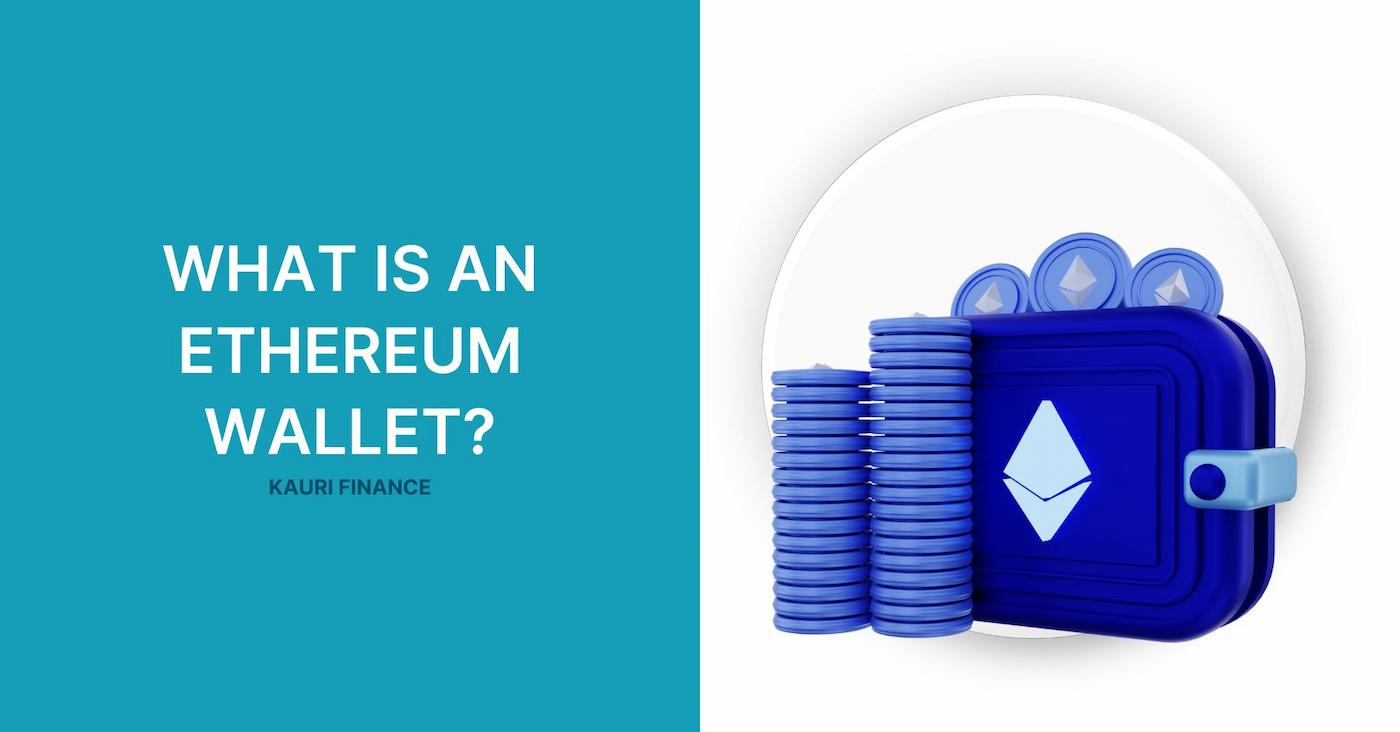
What is an Ethereum Wallet?
- What is an Ethereum Wallet?
- How Ethereum Wallets Work?
- Key Generation and Management
- Importance of the Secret Recovery Phrase
- Types of Ethereum Wallets
- Software Wallets
- Mobile Wallets
- Desktop Wallets
- Ethereum Wallet Extensions
- Paper Wallets
- Hardware Wallets
- Choosing the Right Ethereum Wallet
- Supported Assets
- Integration with dApps
- Custodial vs. Non-Custodial Wallets
- Kauri Finance Web3 Wallet
- Conclusion
- Choosing Your Ideal Wallet

Known for its robust ability to support smart contracts and decentralized applications, Ethereum has become the backbone of digital innovation. At the heart of interacting with this dynamic ecosystem are Ethereum wallets. These wallets are not just tools for storing digital currency, they serve as critical interfaces that connect users to the decentralized functions of the Ethereum blockchain. Ethereum wallets provide seamless access to the blockchain's vast network, from managing digital identities to working with a multitude of crypto assets and applications. In this guide, we will explore the complex mechanisms of Ethereum wallets, understand their different types, and learn how they allow users to efficiently navigate and leverage the potential of the Ethereum ecosystem.
What is an Ethereum Wallet?
Ethereum wallet is a sophisticated digital interface designed to manage and interact with Ethereum-based assets. Far beyond simple storage, these wallets play a crucial role in the Ethereum ecosystem by enabling users to execute transactions, manage cryptographic keys, and engage directly with decentralized applications (dApps) hosted on the Ethereum blockchain. Essentially, an Ethereum wallet acts as a bridge between the user and the decentralized network, allowing for the secure management of cryptocurrencies and smart contracts.
How Ethereum Wallets Work?
Ethereum wallets utilize a hierarchical deterministic (HD) framework that enhances the security and versatility of managing digital assets. This system allows for the generation of a series of private and public key pairs from a single seed phrase, enabling users to operate multiple Ethereum addresses and transactions securely and efficiently.
Key Generation and Management
At the core of an Ethereum wallet's functionality is the generation and management of cryptographic keys:
- Public Key: This is akin to your account number, it is what you share with others to receive Ethereum or tokens.
- Private Key: This acts like a password or digital signature, it is what you use to securely authorize transactions and prove ownership of your assets.
Importance of the Secret Recovery Phrase
A critical component of HD wallets is the secret recovery phrase, often composed of 12 to 24 words. This phrase is a human-readable form of your wallet’s master seed. Losing access to a device or suffering a hardware failure doesn’t mean losing your assets, as long as you have your recovery phrase. This phrase can restore your wallet and all associated addresses and funds on a new device, making it a vital part of your security strategy to keep it secret and safe.
Types of Ethereum Wallets
Software Wallets
Software wallets are user-friendly digital wallets that are typically free to download and easy to set up. They provide convenient access to Ethereum's network and are suitable for both new and experienced users. However, because they are connected to the Internet, they are susceptible to malware and hacking attempts. Users should maintain robust antivirus protections and be cautious about downloading software from reliable sources only.
Mobile Wallets
Mobile wallets run on smartphones and tablets, making them highly convenient for on-the-go transactions. They often feature built-in QR code scanners, simplifying the process of sending and receiving cryptocurrencies. While mobile wallets offer enhanced accessibility, they share similar security concerns with other software wallets due to their internet connectivity and the general vulnerability of mobile devices.
Desktop Wallets
Desktop wallets provide a more comprehensive set of features compared to their mobile counterparts and are designed to run on personal computers. They often offer enhanced security measures and a wider range of functionalities, but like all software wallets, they are at risk of malware and spyware if the host computer is compromised.
Ethereum Wallet Extensions
Wallet extensions for web browsers offer seamless integration with web applications, facilitating quick interactions with Ethereum’s dApps directly from the browser. While convenient, their always-connected nature makes them vulnerable to security breaches. Users should ensure browser wallets are only used on secure, private networks.
Paper Wallets
Paper wallets are one of the most secure forms of Ethereum wallets as they store Ethereum keys offline on printed paper, making them immune to online hacking threats. However, they are susceptible to physical damages such as water, fire, or getting lost. Users should store paper wallets in secure, dry places and consider using safes or deposit boxes for the best protection.
Hardware Wallets
Hardware wallets are physical devices designed to securely manage wallet private keys offline. They are considered one of the safest ways to store cryptocurrencies because the keys never leave the device and are not exposed to a potentially compromised computer. Hardware wallets can manage multiple accounts and are capable of signing transactions in a secure, offline environment, then broadcasting them online without exposing private keys.
Choosing the Right Ethereum Wallet
When selecting an Ethereum wallet, users must weigh several factors to find the best fit for their needs. Security is paramount, choosing a wallet that offers strong protection measures, including encryption and offline storage options, is crucial. Convenience is also important, particularly for those who transact frequently. Wallets that provide easy access to funds and straightforward user interfaces are highly valued.
Supported Assets
Ensure the wallet supports a wide range of Ethereum-based tokens (ERC-20) and other standards like ERC-721 for NFTs, which will enable users to manage diverse portfolios from a single wallet.
Integration with dApps
For those heavily involved in the Ethereum ecosystem, a wallet’s ability to seamlessly interact with decentralized applications (dApps) is vital. This integration allows users to utilize decentralized exchanges, gaming platforms, and other blockchain-based services directly.
Custodial vs. Non-Custodial Wallets
The choice between custodial and non-custodial wallets impacts asset control. Custodial wallets, managed by third parties, are akin to banking with traditional financial institutions, where the service provider holds your funds. In contrast, non-custodial wallets give you full control over your keys and, consequently, your assets. This autonomy aligns with the decentralized ethos of cryptocurrency, emphasizing the importance of self-custody in managing digital assets securely.
Kauri Finance Web3 Wallet
Kauri Wallet stands out as a secure, non-custodial solution that empowers users with full control over their digital assets. Unlike custodial wallets, Kauri Finance's wallet ensures that only you have access to your private keys and, by extension, your funds.
The wallet is designed to accommodate both beginners and experienced users, offering an intuitive interface that simplifies navigation and transaction processes. It integrates seamlessly with various DeFi platforms, enhancing user engagement with the broader Ethereum ecosystem.
Security is a cornerstone of Kauri Finance's Web3 Wallet, incorporating advanced encryption technologies to safeguard your assets. It supports two-factor authentication (2FA) and continuous security updates to protect against new threats, ensuring your digital assets are safe from unauthorized access.
Kauri Finance’s wallet is not only about security but also about providing a gateway to the decentralized world of finance. It facilitates smooth interactions with DeFi platforms and supports a wide array of Ethereum-based assets, making it an ideal choice for users looking to dive deep into the capabilities of Ethereum.
Conclusion
Orientation of the world of Ethereum wallets is crucial for anyone engaging with the blockchain's vibrant ecosystem. From managing digital identities to interacting with decentralized applications, the right Ethereum wallet acts as your gateway to the blockchain's vast capabilities. This guide has illuminated the different types of wallets available from the readily accessible software wallets to the ultra-secure hardware options and the unique attributes each brings to your digital asset management.
Choosing Your Ideal Wallet
For those seeking a robust and user-friendly solution, Kauri Finance’s Web3 Wallet offers a comprehensive tool for managing Ethereum assets securely. It's designed to cater to both novices and seasoned users, ensuring that managing your crypto holdings is both simple and secure. With its strong emphasis on security and an intuitive interface that connects seamlessly with the broader DeFi ecosystem, Kauri Finance’s Web3 Wallet is an excellent starting point for anyone looking to make the most out of their Ethereum experience.
